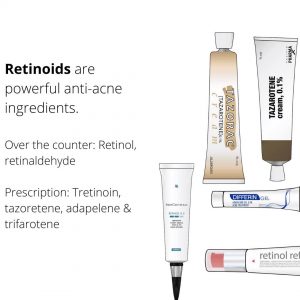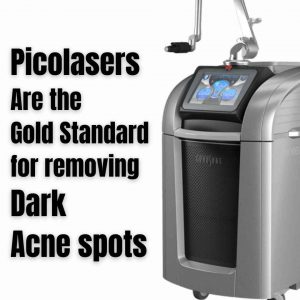Acne Scars Skin Care At A Glance
- Best ResultsWith clinical revision
- Treatment RecoveryNA
- Procedure TimeNA
- Skin SpecialistGuidance from clinician
- Duration of ResultsVariable - years
- AnaestheticNA
- Back to WorkNA
- Cost$
Acne Scars Skin Care
Skin care at home can help reduce acne & pigmentation, as well as improve collagen. Simple & precise skin care products can lay the foundation for improved skin- for life. The ABC’s of skin care, coupled with antioxidants, skin care acids & collagen boosters can complement scar revision procedures.
FactsFacts on Acne Scars Skin Care
- Simple skin care can help build a foundation for life
- The foundation is to prevent & treat acne early
- Retinol & retinoids can remodel collagen & decrease outbreaks
- Niacinamide can reduce inflammation & redness
- Pigment correctors can improve post inflammatory hyperpigmentation
- Sunscreen is essential for patients on scar revision programs
Can skin care help with acne scarring?
Acne Scars Skin Care
Well formulated skin care gives marginal improvements in established scars. For mild & early scarring, collagen stimulation products such as retinoids, ascorbic acid, & skin care acids can help.
Red acne scars, known as PIE or post inflammatory erythema can improve with adequate sunscreen, vitamin B3 & vitamin C.
What simple things can I do at home to help my scar revision journey?
By far, the most important aspect of DIY treatments should be focused on preventing acne. Once you have achieved this, you can look at scar improving procedures & skin care. Active acne slows down scar remodelling, hence the importance of gaining absolute control early.
The following suggestions are not designed to replace clinical analysis & specialist management of acne scarring, but to help you build a better understanding of skin care, laying down the foundation for life.
This page only discusses topical skin care, for more information on sensible DIY procedure, review the page on home treatments for acne scars.
What are the best creams for acne scars?
Retinoic acid can treat acne & early acne scars. Differin or adapalene is the most studied retinoid for the treatment of acne scars. This is OTC or over the counter in the United States & in some countries in Europe. In Australia it is prescription only (however, apparently you can order this through Amazon or other websites. Hint.) Review the section on how to use retinoids on this website for better understanding.
Retinol is my go to ingredient during the scar revision process. I prefer retinol over retinoids simply because it is much easier to use & titrate. During your scar revision journey, your skin’s barrier function will be compromised following microneedling, RFM, peels & laser resurfacing. In many cases prescription retinoids can prolong redness post procedure- hence why I advocate retinol during the revision journey & retinoids after.
Glycolic acid can be useful in the management of acne scars, especially the post inflammatory hyperpigmentation. This skin care acid acts as an exfoliant in lower concentrations of 8 to 15%. High concentration AHAs can stimulate dermal collagen. As with retinoic acids, incorrect use during your revision journey can lead to prolonged healing.
Ascorbic acid or vitamin C can reduce dark acne spots, known as PIH or post inflammatory hyperpigmentation. Formulations containing 10-20% L-Ascorbic Acid are recommended. Note- Vitamin C & Retinoids / AHA can cause significant skin irritation if used together. For patients with skin type 3 or above, I occasionally initiatie ascorbic acid post resurfacing.

Niacinamide or vitamin B can reduce inflammation from acne, in addition to reducing post acne marks. This vitamin is best for patients who have sensitive skin with associated red marks (post inflammatory erythema.)
Disclaimer: My work is a procedural dermatologist, I do not consult with products in mind. My focus is on lasers, surgery, & injectables. My clinical staff are experts in the field of product use.
Why is sunscreen vitally important during scar revision treatments?
Adequate use of sunscreen can markedly accelerate your scar revision process. This is because after procedures such as microneedling, RF microneedling, lasers & peels, your skin is prone to pigmentation changes, including brown (post inflammatory hyperpigmentation) & red, (post inflammatory erythema).
With subsequent treatments, these colour changes can be prolonged. The use of sunscreen will accelerate your recovery, assisting both me & my team as this allows us to provide better treatments (often higher settings). If you have pigment changes, we will have to back off on treatments until your skin recovers.

View our Treatment Gallery
How can you treat brown acne marks at home?
Brown marks from acne are termed PIH or post inflammatory hyperpigmentation. Over half of the cases will persist for 12 months or longer. You can do the following DIY treatments to reduce or prevent PIH-
- Sunscreen. Twice a day, regardless of sun exposure
- Retinoids can reduce acne, preventing PIH
- Vitamin C can repair scars & reduce pigment
- Azelaic acid is a powerful anti-inflammatory & pigment inhibitor
- AHAs such as glycolic acid can fade pigment
For DIY treatments, sensible AHAs & exfoliation can help. If you are struggling with brown marks, please consult my clinical team @cliniccutis. My nurses & therapists are well versed in the management of brown spots-PIH. We employ nano, pico & fractional lasers to help improve skin texture & scars.

What skin care ingredients can treat red acne scars?
Red marks from acne are termed macular erythema, or PIE (post inflammatory erythema). These are notoriously difficult to remove at home without lasers. As always it is imperative to control ongoing acne, or you will be chasing new marks from future breakouts.
Sunscreen use will decrease the intensity of redness. Red marks take 6-18 months before fading, vascular lasers are best at removing them (2-4 sessions). You can use vitamin C in the morning & niacinamide in the evening.
Can I perform chemical peels?
AHA peels including lactic, glycolic, & mandelic acid peels can be done at home with absolute caution. Start with 10-15%, increasing as tolerated. Don’t get burned. If you have residual acne & or red marks, a simple salicylic acid wash can decrease inflammation.
A more sensible routine is to incorporate a good AHA ‘leave on’ formulation consisting of 8 to 15% glycolic acid. This is an exfoliant and can increase the turnover of dead skin cells. Start of two nights a week, increasing as tolerated.
Can spot treatments reduce pigmentation?
There is some evidence that spot treatments with microneedle patches can reduce brown pigmentation. These patches aid in trans-epidermal delivery of pigment inhibitors. These patches are best combined with high factor sunscreens.

What can peels do?
Peels include:
- Salicylic acid peels: great for acne, blackheads, oily skin, congestion.
- AHA peels: Lactic, glycolic, mandelic acid for overall skin rejuvenation, wrinkles & pores.
- Retinoid Peels: Vita peels are useful for acne prone skin & pigmentation.
For an understanding of what is your ideal peel, book a consult with my clinical team @cliniccutis.
Will collagen supplements help?
There is no good evidence to suggest that collagen supplements help in the context of acne scars, however collagen supplements may help joints. I have no problems with collagen additives or supplements as they are cheap, safe & importantly do no harm.
Eating a well balanced diet is more important than supplementation.
What is a sensible skin care routine in between acne scar revision appointments?
My nurses will guide you accordingly, depending on your procedure. A general skin care guide goes something like this-
- Start sunscreen application (Anthelios XL) or Invisible Zinc 1 day after your skin has recovered. In most cases it will be 3-7 days post procedure.
- Start a good quality Retinol formulation 72 hours after you have healed. Apply 3 nights per week for the first week after you have recovered, increasing by one night per week there after.
- Titrate the amount & the frequency of retinol. If you have any skin irritation or prolonged redness skip a few days.
- You can start a Vitamin C L-Ascorbic formulation at week 2 post procedure. As with retinol, titrate your application. Use only in the mornings.
How do I manage post inflammation from lasers & or TCA Peels?
Prior to the procedure, either I or my staff will discuss the probability of skin color changes after lasers, RFM or deep peels. The chances of this occurring will depend on your skin color, sun exposure, & level of treatments.
If you are at risk of developing PIH we will provide you a skin care guide to help reduce laser/peel induced pigment. Please follow the instructions as they are unique to your treatment.
As a guide, start SPF when your skin is healed (3-7 days). You can start on HQ (Hydroquinone) or equilievent pigment inhibitor a day or two after you start your SPF. USe at night, increasing as tolerated. Only put your pigment corrector on affected or treated sites. Do NOT put on non-affected areas.
Be guided by the nurse who is looking after you.

When do I stop skin care prior to procedures?
You can stop the night before. Your treating nurse will remove any residual skin care residue the day of treatment. Additionally you will be clean & disinfected in the treatment room prior to any procedure.
Davin’s Viewpoint- skin care for acne scars
I do think that skin care is important, not because it makes any noticeable difference to established scars, but because it teaches patients the value of prevention & looking after their skin.
I always start with the absolute foundation- namely sunscreens. Use them correctly. They are important. They allow me or my nurses to treat your scars with higher settings. This means better results, less side effects, less treatment sessions, & less costs.
From there, add retinol. Why retinol over a prescription retinoid? Because the latter is much harder to modulate, especially if you are having revision treatments that can make you skin more sensitive. Certainly post procedure, a retinoid is sensible.
If your skin can tolerate it, ascorbic acid is sensible to add in the morning. It can protect your skin (antioxidants) & decrease pigment production. Additionally it can theoretically increase collagen production.
